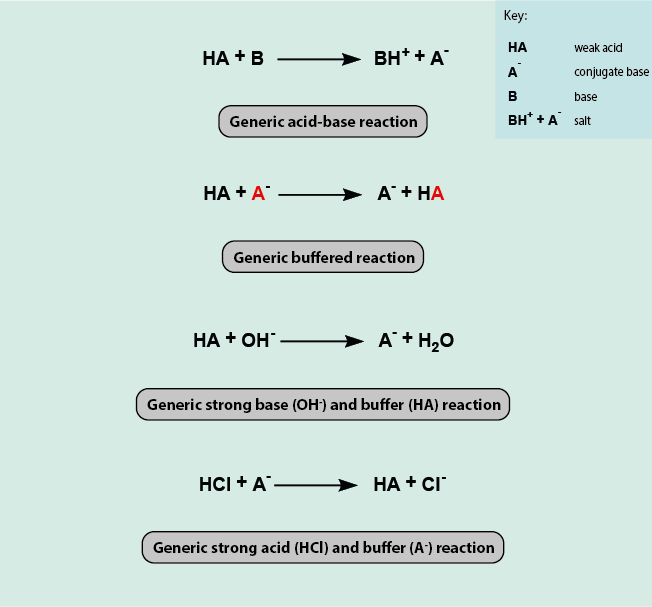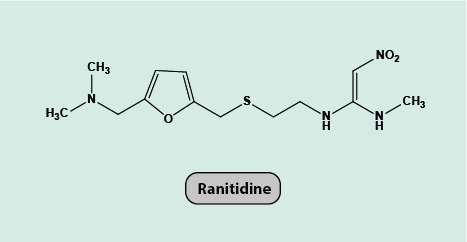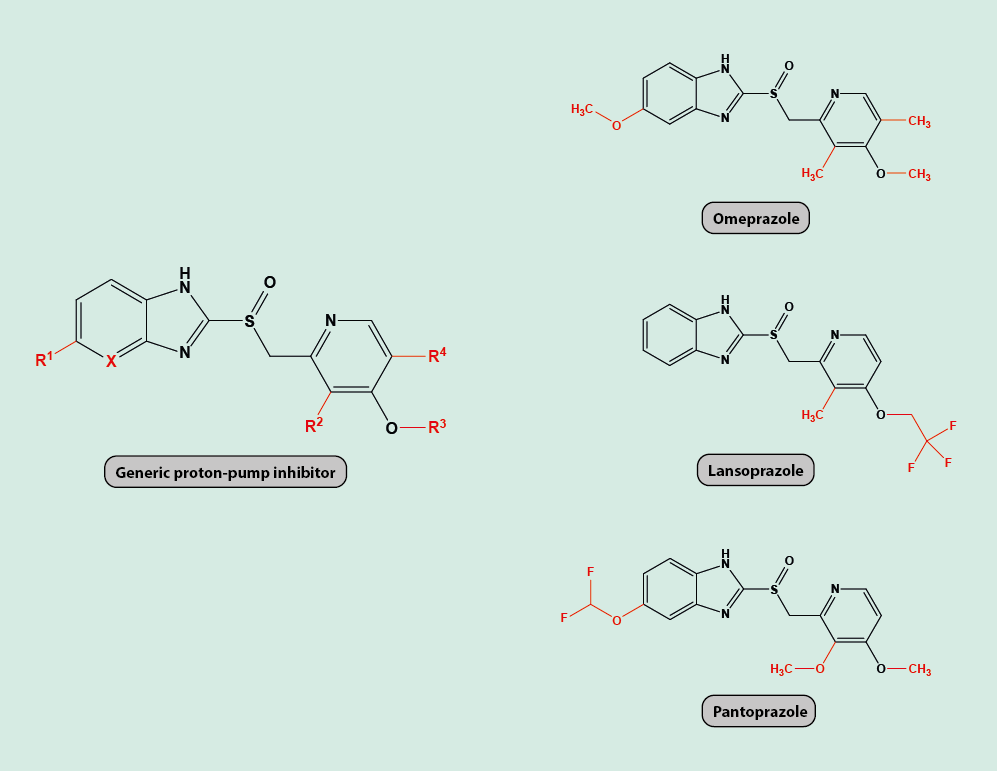Antacid medications
Antacid medications do not directly address any oral and maxillofacial conditions. However, some of these drugs may serve a useful purpose as adjunctive (supporting) medications to protect the lining of the gastrointestinal tract, in particular of the stomach.
Antacid medications can be broadly subdivided into three types according to their mode of action:
- a variety of preparations that simply neutralise surplus stomach acid and/or provide a protective layer for the stomach lining;
- drugs that reduce the release of stomach acid by bonding to a particular receptor on the surface of stomach cells (H2 receptor antagonists);
- drugs that irreversibly block an enzyme (the ‘gastric proton pump’) that is involved in the release of gastric acid (proton pump inhibitors, PPIs).
A wide range of over-the-counter preparations to deal with milder forms of indigestion simply undergo an acid – base, or a buffered reaction with excess gastric acid (Figure 1). Neutralising excess acid usually gives quick relief of symptoms. These remedies are available in the form of liquids, suspensions, water-soluble tablets, lozenges or chewable tablets.

Such preparations typically contain aluminium or magnesium hydroxide Al(OH)3 or Mg(OH)2, magnesium or calcium carbonate MgCO3 or CaCO3, sodium bicarbonate NaHCO3 (also known as baking soda).
Some liquid preparations and suspensions contain further active ingredients such as alginates, which can create a temporary protective coat in the gastrointestinal tract. Alginates are organic polymers that are made up of chains of various sugar molecules and are isolated from a variety of algae and seaweeds. These polymers act as a barrier for acid and non-acid stomach fluids (such as pancreatic enzyme fluid), protect the stomach lining and enable healing in this way. A synthetic version of a related chemical that also provides a protective layer for the stomach lining is sucralfate. Sucralfate is a complex of sucrose octasulfate with aluminium hydroxide. It dissociates in the acidic stomach environment, where it subsequently polymerises and forms a protective film on the stomach lining; sucralfate is used in the treatment of stomach ulcers. A pre-polymerised version of sucralfate is used in the treatment of oral mucositis.
H2 receptor antagonists reduce the production of gastric acid by competing with the histamine receptor in gastric cells by binding to this receptor and thus blocking it for histamine. Histamine, alongside food and insulin, triggers the release of gastric acid, hydrochloric acid (HCl), when binding to the H2 receptor. By blocking this histamine action, the secretion of the volume of gastric acid as well as its acidity are reduced. This is a useful mechanism to allow time for healing of stomach ulcers. Commonly used H2 receptor antagonists are ranitidine (Figure 2) and cimetidine.

H2 receptor antagonists are generally well tolerated medications, but like all medicinal drugs can have adverse effects. Reducing the amount of gastric acid in particular enhances the risk for infections of the gastrointestinal tract, especially diarrhoea. The absorption of vitamin B12 through the stomach lining is impaired and may lead to vitamin B12 deficiency (which needs to be replaced usually by intramuscular injection every three months).
Proton pump inhibitors, PPIs provide a more profound and long-lasting suppression of the secretion of gastric acid (up to 99 %) by irreversibly blocking the enzyme that orchestrates the last stage of gastric acid secretion. This gastric proton pump enzyme, hydrogen/potassium adenosine triphosphate enzyme (H+/K+ ATPase), is very effectively blocked by a particular type of chemical (Figure 3), of which many variations have been developed.

The adverse effects of PPIs are similar to those of H2 receptor antagonists (see above) but tend to be more pronounced and include a reduction in iron uptake and thus may cause iron deficiencies. It is generally not recommended to use PPIs as long-term medications. The major issue, aside from gastrointestinal hurry, is that 60 % of people taking PPIs for more than two years will require three-monthly vitamin B12 injections.
There are two circumstances where maxillofacial surgery may make use of antacid medications, H2 receptor antagonists or (more commonly) proton pump inhibitors. The first application is as a supportive medication to prevent damage to the stomach lining by a range of drugs taken orally. Medications that are used in maxillofacial surgery and that may cause such damage include
- a wide range of analgesic drugs, in particular aspirin and all nonsteroidal anti-inflammatory drugs (NSAIDs);
- a number of antibacterial agents, including erythromycin and tetracyclines;
- steroids , including prednisone and methylprednisolone, and oestrogen (for example, in oral contraceptives);
- other commonly prescribed medications, including statins (to lower cholesterol levels), thyroid hormone replacement drugs, and some medications used to lower blood pressure.
Another use of proton pump inhibitors, is during surgery under general anaesthesia, for people suffering from acid reflux. In order to prevent aspiration of gastric acid under these circumstances, a proton pump inhibitor may be given ahead of surgery. The most common indication is if general anaesthesia is needed in pregnancy or for people with a hiatus hernia.